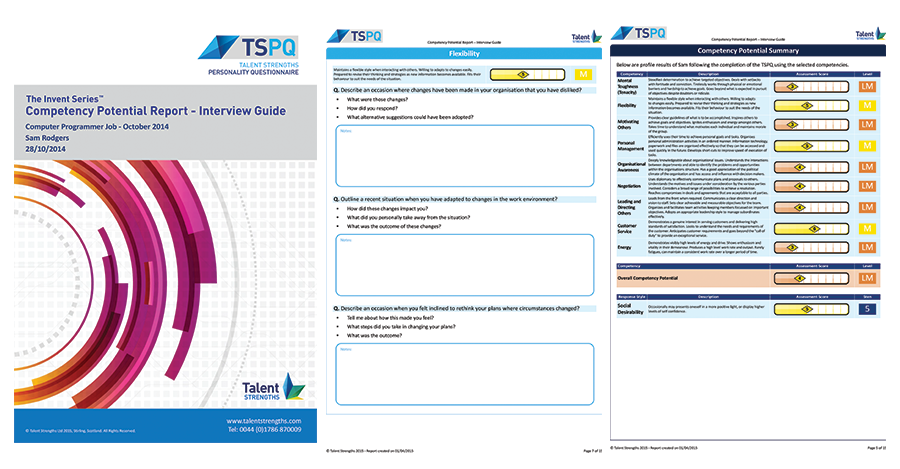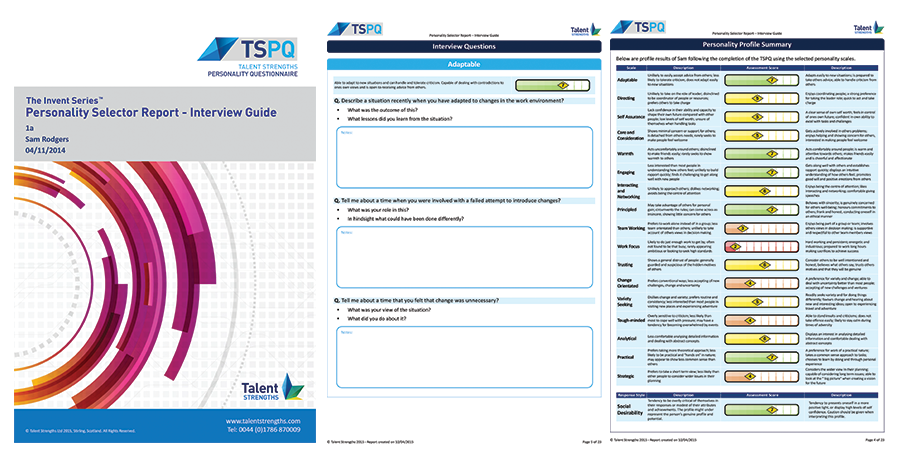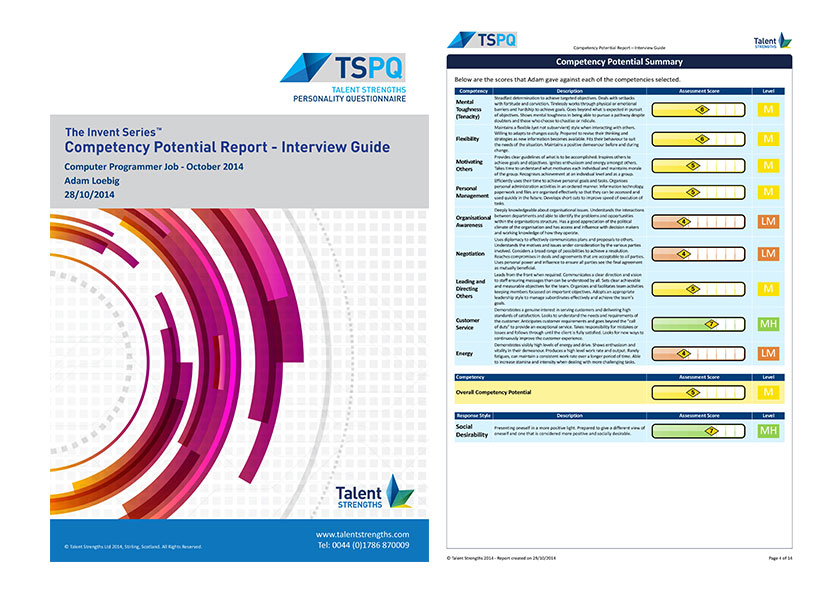Personality/Behavioural Assessment – TSPQ™
The ground breaking Talent Strengths Personality Questionnaire (TSPQ™) builds on the latest empirical research linking personality to performance.
The Talent Strengths Personality Questionnaire is a dynamic behavioural assessment that enables practitioners to select the personality dimensions that they wish to use in a recruitment or employee development project and to deploy only those dimensions in an assessment solution. The TSPQ – Invent Series™ delivered through the Talent Strengths Assessment Software System is designed to enable organisations to ‘invent’ or create their own personality assessment from a compendium of 47 pre-validated personality scales contained within the TSPQ™. Dimensions can be selected directly or through using the TSPQ™ Job Competency Analysis Questionnaire.
Within the TSPQ range, Talent Strengths provides two different profile reports with tailored interview questions.
These are:
- The Competency Potential Report – Interview Guide
- The Personality Selector Report – Interview Guide
Depending on your personal preference, you may wish to use competency language in your recruitment process or to work directly with the results using selected personality scales. The two report options cater for both requirements.


Using the Personality Selector Report, practitioners can select from a compendium of 47 personality scales to create their own tailored personality assessment. This can be deployed immediately for use in a recruitment or selection campaign. If you are unsure which scales to focus on, you can use the integrated Job Competency Analysis Questionnaire which identifies the key competencies of greatest relevence to the job role but also show the underpinning personality scales that you can select.
The Personality Selector Report provides a colour profile of the individual’s results, but also provides linked interview questions to help validate the results with evidence from the candidate. A summary page is provided to enable practitioners to write final comments and to mark their opinions with the results of the interview.

Better Performance Prediction
Although the TSPQ™ has an excellent coverage of “Big Five” personality traits, research conducted at this higher (big five) level has proven to be not nearly as powerful in predicting and explaining actual behaviour compared to using the more numerous lower-level traits.
Many studies have confirmed that in predicting actual behaviour, the more numerous the facets or primary level traits, the more effective they are at predicting (e.g. Mershon & Gorsuch, 1988; Paunonon & Ashton, 2001). As a result, by developing the TSPQ and by providing a wider choice of lower level traits, organisations can more accurately and more effectively select appropriate personality traits that relate more closely to the local context of the performance criteria at hand.

Custom Assessments Versus “Off the Peg”
Until now, it has been helpful and common practice for most assessment practitioners to use named assessments (safety profile, sales profile, leadership assessment etc). Each of these attempts to cover generic attributes or competencies expected for performance in specific role types. They may even have predictive studies to support their validity. However many do not take account of the environmental or contextual challenges of the role due to their generic nature. Furthermore some of these generic assessments may have been trialled and developed in an entirely different sector or environment where there are different challenges and pressures.
The TSPQ Invent Series™ helps organisations accurately identify what is important in their own environment and measures the attributes and competencies that matter in their role. Using TSPQ™ based custom assessments, practitioners will efficiently measure only the attributes that matter, focussing their valuable interview time on the rank ordered competencies identified by the TSPQ™ reports.
As an example, two different sales jobs may have entirely different management or subordinate pressures, performance targets, political or cultural norms, market challenges, environmental pressures, differing equipment and tasks with variable levels of complexity. Although both sales roles may share a few performance competencies, a generic recruitment solution will without doubt, miss important factors and competencies in each role. A custom solution created using the TSPQ Invent Series™ will be more accurate in identifying relevant competencies and will reflect the current challenges of each role more closely.

